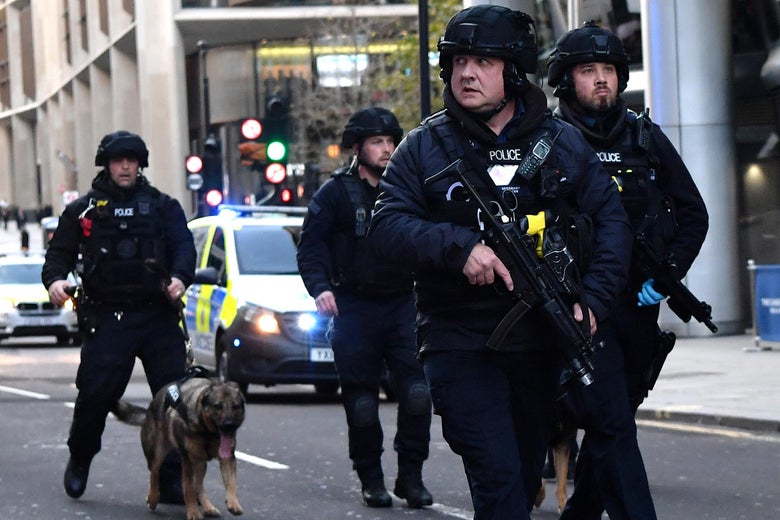
Armed police with dogs patrol along Cannon Street in central London, on November 29, 2019 after reports of shots being fired on London Bridge.
BEN STANSALL/Getty Images
The 28-year-old attacker who stabbed a man and a woman to death in London on Friday had already been convicted of terrorism charges and served six years in prison, opening up a fresh debate about the early release of prisoners and a round of finger-pointing ahead of a crucial election. Usman Khan, who was born and raised in Britain, was shot dead after he stabbed at least five people Friday while wearing what turned out to be a fake suicide vest. The man and woman who were killed in the attack have not been identified. Three others—a man and two women—were also injured and are still in the hospital.
Khan was one of nine people who were part of a cell inspired by al-Qaida sentenced in 2012 of plotting to bomb several London landmarks, including the stock exchange. Khan was ultimately sentenced to 16 years but served less than half of that and was released in December 2018 on parole with several conditions, including the wearing of an electronic tracking device on his ankle. Khan was wearing the device at the time of the attack.
Khan launched the attack Friday while he was attending an event by a Cambridge University-backed program that is meant to help rehabilitate prisoners. The attack appears to have started where the event was taking place before Khan moved outside onto London Bridge, where Khan was ultimately tackled by civilians and shot by law enforcement officers.
The attack took place less than two weeks before Britain is scheduled to hold a national election on Dec. 12 that could decide the future of Brexit. Although the main political parties suspended campaigning after the attack, finger-pointing immediately began that could have an effect on the vote. So far the campaign has been dominated by the plan to leave the European Union and the country’s health service but now crime is likely to take center stage. Member os the opposition Labor Party were quick to criticize the government’s record on crime. “There are big questions that need to be answered,” London Mayor Sadiq Khan said. “One of the important tools judges had when it came to dealing with dangerous, convicted criminals… was their ability to give an indeterminate sentence to protect the public,” he added, claiming that “was taken away from them by this government.”
Chris Phillips, a former head of the UK national counter-terrorism security office, accused the justice system of playing “Russian roulette” with the public and said it “needs to look at itself.” The country’s security minister, Brandon Lewis, has refused to comment on the case but did say sentencing rules needed to be reviewed. Prime Minister Boris Johnson, meanwhile, said that his “immediate takeaway” after the attack was that prisoners need to spend more time behind bars. “When people are sentenced to a certain number of years in prison, they should serve every year of that sentence,” he added.
Readers like you make our work possible. Help us continue to provide the reporting, commentary and criticism you won’t find anywhere else.
Join Slate Plusfrom Slate Magazine https://ift.tt/2XZvn1p
via IFTTT
沒有留言:
張貼留言